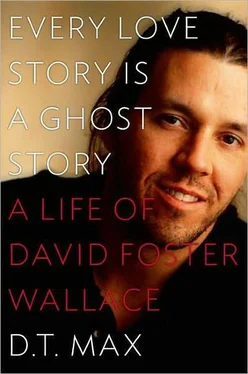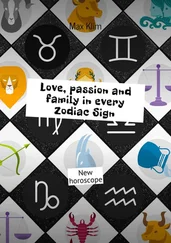Fortunately, by now Dale Peterson had gotten Wallace the teaching position at his alma mater , a development that for Wallace held the hope of calm after the perturbations of Yaddo and New York. If he was going to have to teach, this seemed the way to do it. He would get $6,500 for just one weekly two-hour fiction workshop in the fall, considerably more than he’d been paid for an entire year of teaching at Arizona. The rest of the time was his for writing. And he could begin by staying at Peterson’s home, where he had housesat in his college years. He could have a bedroom—“like a real person,” Peterson offered in a letter — or sleep in the family room if he preferred, with Lolita, the parrot he had transfigured into Vlad the Impaler in Broom , until he found, he wrote, “less seedstrewn accommodations.” Wallace was superstitious. He thought if he could recreate some of the ambience by which that novel had coalesced like magic, a similar inspiration might strike again. He sensed that he was at a crossroads; it had been a long time since he had tried to write without teachers and workshops.
So by late August he was back at Amherst, slightly more than two years after he had left it. He moved temporarily into the Peterson home. It was perhaps a bad omen that Lolita had just died—“Her little ticker didn’t quite hold out long enough to meet her re-maker,” Peterson wrote. But he was happy to find that Andrew Parker, his favorite literature theory teacher, was willing to share an office. Peterson was lending him his cubicle in Frost too. Even so, immediately Wallace sensed that he’d made a mistake. Amherst in 1987 wasn’t his Amherst. Nearly everyone he knew was gone; he was alone. Walden and Wallace had left their relationship on hold over the summer, and now he reached out to her, suggesting marriage for the second time. Wallace told his friends they’d chosen a date in the late fall at a church in Cicero, outside of Chicago; Walden’s father, a minister, would preside. Wallace asked Costello to be best man. His friend suggested he make sure he was going in with his eyes open. “They’re saucers,” Wallace replied. But Walden was wary, understandably. She came east to be near Wallace, moving in with a friend in Belchertown, a few miles from Amherst, and she and Wallace made efforts to reestablish their relationship. But his drinking and depressiveness worried her and she kept her distance.
At the core the problem for Wallace was what to write next. He had said what he had to say in “Westward.” It was what he had been born to write, and having done so, as he would later explain to an interviewer, he had “killed this huge part of myself doing it.” Much like an addict looking back on a final binge, Wallace would later shudder at its memory, calling the effort “a horror show…a permanent migraine…crude and naïve and pretentious.” To Franzen he would reflect, “I wanted something utterly open,” like “the bleeding guts of a patient who should die on the table, aetherized, but won’t.” Since finishing the novella, he hadn’t written a word; the story, he realized, as he would tell a later interviewer, was also “a kind of suicide note”—if he wasn’t precisely a metafictionist, he was certainly someone for whom pulling off the façade of realism was congenial. The arrow he had killed the fictional Gale with had pierced him too.
At Yaddo he had drunk heavily as a replacement for pot, and because McInerney did, and a part of him wanted to be McInerney. But here at Amherst, still without pot, the alcohol itself became an issue. He wrote JT that he had “picked up a bit of a drinking problem and am currently grappling.” The blithe note belied his upset that what had begun as a placeholder was now a new addiction and thus a new source of disgust with himself. He might not have drunk if he had had some work to do, but his days seemed empty and pointless. 6When he got the news that the Paris Review had taken “Little Expressionless Animals,” he told JT that the sale made “Viking pretty happy,” but “at this point I don’t really care.” On arriving in Amherst, he had worked his way through Peterson’s liquor cabinet and then quietly replaced the bottles, only to work his way through them again. Soon he got an apartment in North Amherst—“not really all that nice, plus expensive,” he wrote Washington, and for a moment he was able to summon some joy at the sight of a New England fall again — at least from behind the scrim of his letter-writing. “I’m squatting amid boxes,” he wrote Nadell in early September, “offering prayers of thanks for some unfurnished privacy. The leaves are threatening to get pretty already.” But his good mood did not last long. “Please please get me out of here,” he pled to Nadell a few weeks later. He said he was listening to “sad Springsteen and Neil Young. I wander around Rick [Vigorous]-like, remembering disasters.” He wrote Forrest Ashby that he was thinking of moving to Canada to be a high school teacher.
Wallace was on the verge of falling into a new depression. The struts that held up his life — classes, his work, his relationships, his drug use — had all been removed. He turned to television now, his drug of last resort, soothing himself with hours of sitcoms, soap operas, and sporting events. He drank still more. 7“Do Not Send Any Bob, Please,” he wrote a connection in Tucson, knowing that marijuana was the last thing he needed. But then, later: “Bob’s presence urgently requested.”
Class began. Broom had done well for a first novel, but Wallace was far from famous. 8To the Amherst undergraduates, he was just a name on the syllabus. In fact, because he was a last-minute addition meant to fill a teaching hole, they knew less about him than about most of their instructors. The students who showed up for his class were surprised to find a man barely older than themselves, carrying a pink Care Bears folder and a tennis racket. Before the first seminar meeting, Wallace had asked for writing samples — admission to seminars at Amherst was selective. When one girl asked why she had to provide a sample of how well she wrote in order to get into a class to learn how to become a better writer, Wallace acknowledged the tautology — and perhaps her anxiety — and told her she could just submit a grocery list. In the end, he taught thirteen students.
Wallace knew that if he taught hard he wouldn’t be able to write, but he also knew that he wasn’t writing anyway, so he went at teaching with fervor, covering the students’ papers with pages of annotations, throwing himself into their work. Teaching brought focus and a sense of accomplishment and the knowledge that he was honoring his parents, and Wallace needed all that. The students were astonished at his intensity.
Feeling he had endured the scorn of the Arizona professors, Wallace made sure his comments were supportive and the tone of the class positive. He did not want to replicate the discouraging classroom atmosphere he had just left. He cautioned the students, as one remembers, not to “tap dance in cleats” on one another’s stories. His syllabus was conventional, meant to teach the basic tools of writing: character, dialogue, and plot. He gave his students Eudora Welty’s “Why I Live at the P.O.” to illustrate the unreliable narrator and Lee K. Abbott’s “Living Alone in Iota” to showcase voice. “Just because it really happened, doesn’t make it good fiction,” he would remind them. He had the ability to shift gears in this way — to go from the pyrotechnics of writing “Westward” to teaching the rudiments of fiction; in fact, the simpler the teaching, the happier it made him. He did not go to class for challenges, personal or intellectual, he went to find certainties of the sort that eluded him in his own writing. Every meeting started with a grammar lesson — the difference between “between” and “among” or “further” and “farther.” “I’m a grammar Nazi,” he liked to tell his students. One day he put the words “pulchritudinous,” “miniscule,” “big,” and “misspelled” on the blackboard. He asked his students what the four words had in common, and, when no one knew, happily pointed out that the appearance of each was the opposite of its meaning: “pulchritudinous” was ugly, “miniscule” was big, “big” was small, and “misspelled” was spelled correctly. The students had rarely seen him so happy. 9
Читать дальше












